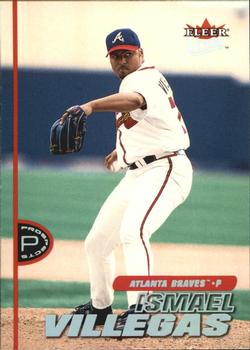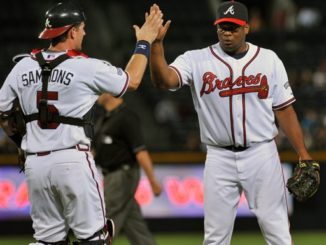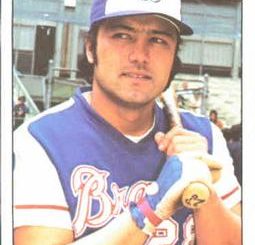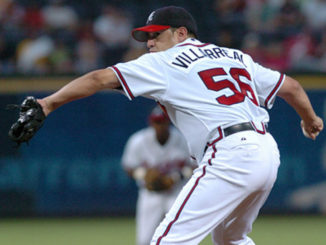
So here are our choices for #70:
Pitcher A: 1 game, 2 2/3 innings, 4 hits, 2 walks, 2 Ks, 2 HR allowed. In a 17-1 loss. Seriously.
Pitcher B: 2 games, 1 2/3 innings, 2 hits, 1 walk, 2 Ks, 2 HR allowed. Atlanta lost both games.
The pickings are, um, slim. I’m going with Pitcher A, and it’s not really because he’s the best pitcher of the two. There is no best pitcher of the two, because “best” implies some sort of quality. Pitcher B may indeed be better, but 2015 Dan Winkler, as he’s better known to you and I, will get a chance to make a name for himself in another number. He’s worn 2 other uniforms since. It’s best not to remember him for this, the worst slice of his Braves career.
Instead, let’s honor Ismael Villegas, who pitched in precisely one major league baseball game – July 3, 2000, in a 17-1 loss to the Montreal Expos.
Villegas was drafted in 1995 out of Puerto Rico by the Cubs. During his debut pro season, 1996, he was traded to Atlanta for C Tyler Houston [while Chicago won the trade, the one-time big prospect Houston was ultimately a disappointment in the Windy City]. Villegas made his way up the minor league ladder, never really standing out but proving himself as an organizational pitcher capable of eating innings, even out of the pen.
In 2002, the Braves had one of the better bullpens in league history. In 2001, they had a pretty good bullpen. In 2000, the bullpen was a mess. In early July, the team’s most reliable middle reliever, Mike Remlinger, had to be placed on the DL. On the same day, Atlanta DFA’d reliever Don Wengert and his 7.20 ERA, and they needed replacements. One replacement was 30 year old former Twins starter Dave Stevens, who in the final 3 innings of his career would push his career ERA just over the 6-run mark. The other was Villegas.
Terry Mulholland had finished a game out of the pen the previous series, but he got the start on July 3. In the 3rd, a 3-run homer off the bat of Jose Vidro gave the Expos a 3-0 lead on Atlanta. In the 4th, Expo starter Tony Armas helped his own cause with an RBI single, pushing the lead to 4-0. After a Javy Lopez RBI single got things back to 4-1, Mulholland imploded in the 5th:
Vidro – single
Rondell White – single
Vladimir Guerrero – RBI single (plus an error on LF Bobby Bonilla), 5-1
Lee Stevens – reached on a run-scoring error by 1B Wally Joyner, 6-1
Chris Widger – sac-fly RBI, 7-1
Michael Barrett – single
By this point, Bobby Cox had seen enough, and called on Ismael Villegas to make his major league debut with 2 on, one out against Orlando Cabrera, whose .393 SLG was the worst among Expo starters in 2000. Cabrera smacked a 3-run homer off the rookie. With the bases cleared, Villegas struck out Armas and retired Wilton Guerrero to end the 5th. Villegas endured a shaky 6th inning, but came away unscathed on the scoreboard. The innings-eater came back for the 7th, and after a hit , 2 outs, and a walk, faced Rondell White in a key situation. White didn’t just hit a 3 run homer. With his 445-foot bomb, he became the first player in Turner Field’s 3 1/2 year history to homer into the club level. Cox left Villegas in to get out of the inning, and he got future HOF-er Vladimir Guerrero to ground out. The Expos led 13-1, and like that, Ismael Villegas’ MLB career was over.
Atlanta found Scott Kamieniecki on the trash heap, and optioned Villegas to the minors a few days later to make room. He’d finish 2000 with a 4.80 ERA in AAA. In 2001, the Braves tasked Villegas with a Mulholland-esque role in AAA, where he posted a 4.15 ERA as a dual starter-reliever. In 2002, he joined the Oakland system, where in 22 1/3 AAA innings he posted an 8.48 ERA (but don’t worry, his FIP was only 8.47). After an equally disastrous season of winter ball, Villegas presumably hung up the spikes.
His MLB career was mostly a disaster, but he did end it by getting out one of the greatest hitters in baseball history. That’s a dream come true for a lot of children.
Is He the Best Ever To Wear #70?
No, certainly not. That being said, MLB history doesn’t really have a great #70. Jumbo Diaz was a useful reliever wearing #70 for the Reds from ’14-’16. George Kontos has worn #70 since 2011, making him the most frequent wearer of #70 in baseball history – he just hasn’t been particularly good. Cards reliever Tyler Lyons has also worn it since his debut.
While Diaz is probably baseball’s all-time best #70, worth mentioning is Bernie Snyder, baseball’s only #70 for nearly 60 years. Snyder played only 10 games, wearing #70 for the 1935 Philadelphia Athletics. In those 10 games, he slashed .344/.364/.375. Less than 200 players have played 10 games and hit over .340 for their careers, and Snyder is one. The 21-year old was traded after the 1935 season to the Albany Senators of the International League. Albany had no MLB affiliation at the time, and Snyder never made it back to the big leagues. But when he died in 1999, he could claim to have a career batting average equal to Ted Williams. That’s pretty cool.




Leave a Reply